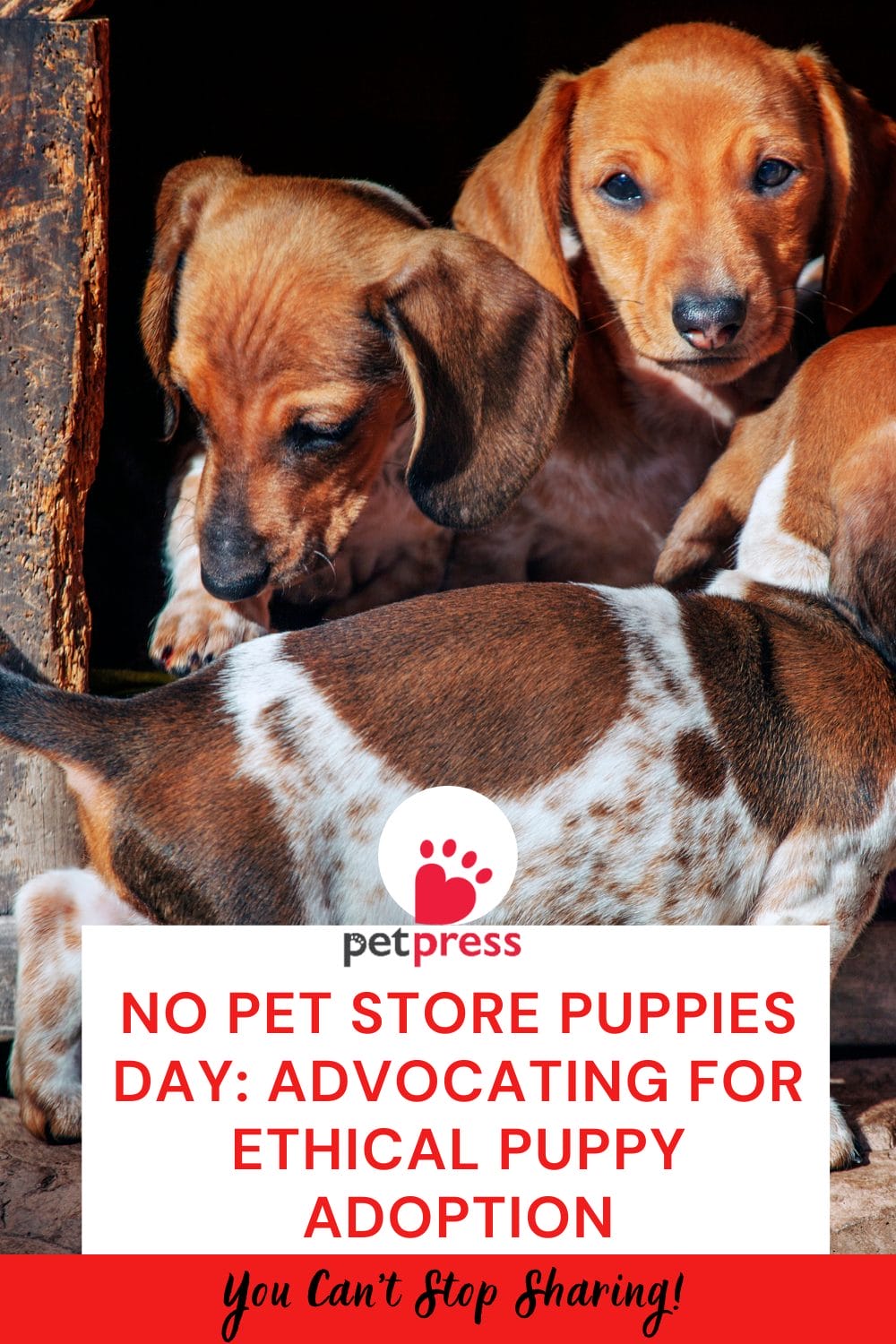
No Pet Store Puppies Day is a significant observance aimed at raising awareness about the importance of adopting pets ethically and the harsh realities of puppy mills.
This day encourages potential pet owners to consider alternatives to pet stores, which often source their puppies from inhumane breeding facilities.
By supporting ethical adoption practices, we can promote better animal welfare and combat the cruel practices associated with puppy mills.
History
No Pet Store Puppies Day was initiated by the Humane Society of the United States (HSUS) in 2011. The day was established to spotlight the issue of puppy mills—large-scale commercial breeding facilities that prioritize profit over the well-being of dogs.
Puppies from these mills are often sold in pet stores, and they typically endure poor living conditions, lack of proper veterinary care, and inadequate socialization.
HSUS launched this day to educate the public about these practices and to promote adoption from shelters and reputable breeders instead.
Significance
The significance of No Pet Store Puppies Day lies in its mission to transform the pet adoption landscape.
Puppy mills often operate under deplorable conditions, leading to severe health and behavioral issues in the puppies they produce.
By avoiding pet stores that source from these mills, consumers can diminish the demand for irresponsibly bred dogs.
This, in turn, pressures pet stores to adopt more humane practices or cease selling puppies altogether.
The day also emphasizes the benefits of adopting from shelters and rescues, where many healthy, loving dogs are waiting for homes.

How to Celebrate No Pet Store Puppies Day
Adopt, Don’t Shop
Visit local animal shelters or rescue organizations to adopt a puppy or adult dog. These organizations often have a wide variety of breeds and sizes, ensuring you find a pet that suits your family.
Spread Awareness
Use social media platforms to share information about No Pet Store Puppies Day and the importance of ethical pet adoption. Use hashtags like #NoPetStorePuppiesDay to reach a wider audience.
Support Legislation
Advocate for laws that regulate or ban the sale of puppies in pet stores unless they come from shelters or rescues. Contact your local representatives to express your support for such legislation.
Educate Others
Host or participate in educational events about the realities of puppy mills and the benefits of adopting from shelters. This could include webinars, community meetings, or school presentations.
Volunteer
Offer your time at a local animal shelter. Shelters often need help with various tasks, from walking dogs to assisting with adoption events.
Donate
Contribute to animal welfare organizations that fight against puppy mills and promote ethical adoption. Your donations can help fund rescue operations, veterinary care, and public education efforts.
What are Some Ethical Ways to Find a Puppy for Your Family
Animal Shelters and Rescues
The best place to find a new pet is through local shelters and rescue organizations.
These groups often have a wide range of breeds and ages available, and they ensure that the animals are healthy and well-cared for before adoption.
Reputable Breeders
If you have your heart set on a specific breed, research and find reputable breeders who prioritize the health and well-being of their dogs.
Good breeders will allow you to visit their facilities, meet the puppy’s parents, and provide health clearances.
Breed-Specific Rescues
Many rescue organizations focus on specific breeds. If you’re looking for a particular type of dog, consider reaching out to breed-specific rescues.
Pet Adoption Events
Many animal welfare organizations host adoption events where you can meet multiple dogs and find the right match for your family.
These events often provide opportunities to speak with knowledgeable staff and volunteers.
Foster-to-Adopt Programs
Some rescues offer foster-to-adopt programs, allowing you to foster a dog before making a permanent commitment.
This helps ensure the dog is a good fit for your household.

Tips to Remember
- Do Your Research: Before adopting or purchasing a puppy, thoroughly research the source. Avoid pet stores and online sellers that cannot provide detailed information about the puppy’s background.
- Ask Questions: Whether you’re dealing with a breeder or a shelter, ask plenty of questions about the puppy’s health, behavior, and history. A reputable source will be transparent and forthcoming.
- Prepare Your Home: Make sure your home is ready for a new puppy. This includes having the necessary supplies, such as food, toys, a bed, and a crate, as well as puppy-proofing your living space.
- Understand the Commitment: Bringing a puppy into your home is a long-term commitment that requires time, effort, and resources. Ensure you are ready for the responsibility before making the decision.
- Support Spaying/Neutering: Adopt puppies that are spayed or neutered, or commit to having this done yourself. This helps control the pet population and reduces the number of unwanted animals.
Conclusion
No Pet Store Puppies Day serves as a powerful reminder of the impact our choices have on animal welfare.
By opting to adopt from shelters and supporting reputable breeders, we can combat the cruel practices of puppy mills and ensure a better future for our furry friends.
Celebrating this day through education, advocacy, and responsible pet ownership helps create a more humane world for all animals.

FAQs
Pet stores often source their puppies from puppy mills, which are notorious for their poor breeding practices and inhumane conditions. By avoiding pet stores, you help reduce the demand for irresponsibly bred puppies.
Reputable breeders will allow you to visit their facilities, meet the puppy’s parents, and provide health clearances for the puppies. They prioritize the health and well-being of their dogs and are transparent about their breeding practices.
Yes, shelters often have a wide variety of mixed-breed dogs available for adoption. These dogs can be just as loving and healthy as purebred dogs and often have fewer genetic health issues.
When adopting from a shelter, you can expect to complete an application process, which may include questions about your home environment and lifestyle. Shelters may also conduct a home visit or require a meet-and-greet with existing pets.
You can help spread awareness by sharing information on social media, participating in or hosting educational events, volunteering at animal shelters, and supporting legislation that promotes ethical pet adoption practices.
- Dogs Pooping Blood: A 2026 Guide for Concerned Pet Parents - February 23, 2026
- How to Celebrate a Dog’s First Birthday on a Budget: 2026 Guide - February 18, 2026
- Best Shampoo for Sensitive Skin Dog Grooming: 2026 Guide - February 12, 2026


GIPHY App Key not set. Please check settings